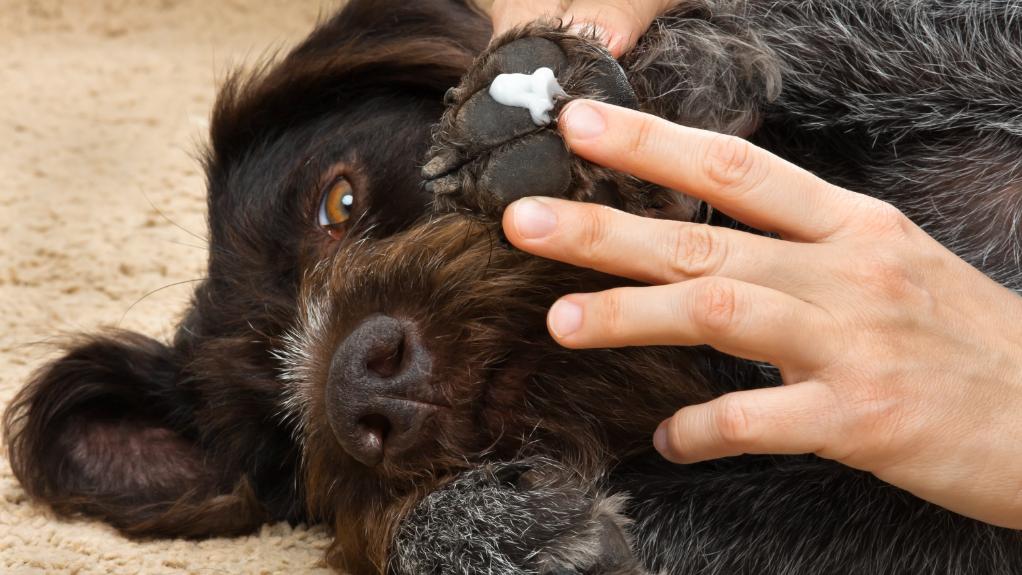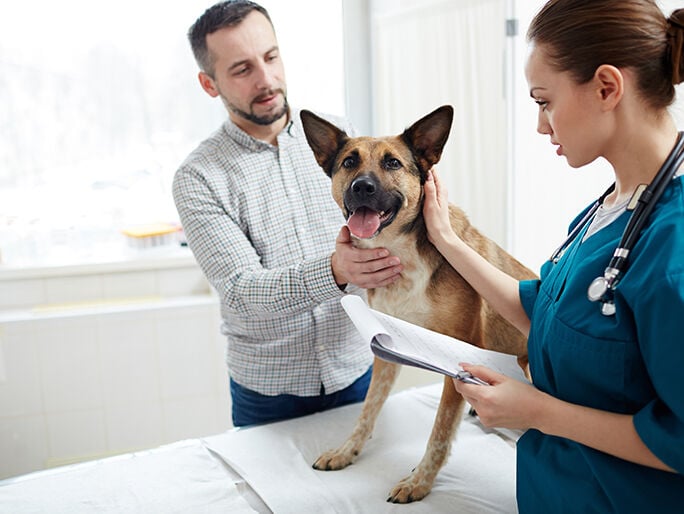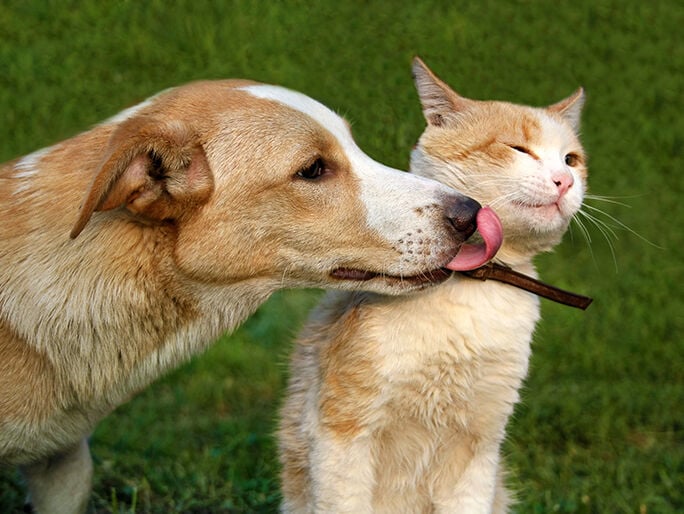symptoms of skin and coat problems
Does your dog or cat have unusual dandruff, itching, lumps, rashes, or a patchy coat?
Underlying health conditions can cause symptoms on your pet’s skin, so it’s smart to see the vet if your pet has itchiness, crusty skin, sores, or new or unusual skin textures, colors, shapes, or smells.

Common skin symptoms in cats and dogs
- Constant scratching
- Bald spots
- Scabs or open sores
- Pustules or rashes
- Tons of dandruff
- Crusty, greasy skin
- Lumps and abscesses

Common causes of skin and coat problems in pets
- Bites or wounds
- Parasites like fleas, ticks, mites, and mange
- Bacterial or fungal infections
- Food or environmental allergies
- Nutritional or hormonal imbalances
Common pet skin and coat concerns
Your pet’s skin and coat can give you a surface-level peek into their health and well-being and be a big tip-off of problems underneath the skin.

Broken skin from bites or wounds
One immediate sign of a skin issue is a bite or wound. Even small injuries like these can easily become infected, trapping bacteria and other crud in a swollen area under the skin. This is called an abscess and it can become a health emergency.
Take your pet for immediate veterinary care if you feel heat or see redness or swelling around the site of an old or new injury or bite.
Fleas, ticks, and other skin parasites
Ear mites, fleas, ticks, and other parasites can cause your pet to scratch and scratch and scratch. Sometimes they can even do damage to themselves: breaking open their skin, making bald spots, and creating blood-filled hematomas (especially on their ears) from scratching. It’s also possible for pets to develop a flea allergy, which compounds the itching.
Your veterinary team can help diagnose and treat your pet. We can also help protect your pet with effective parasite control — ask us what we recommend.
Itchiness and skin injuries from scratching
It’s not unusual for fleas, ticks, or food or environmental allergies to lead to itchy inflammation and skin issues. These skin allergies, called atopy, can be environmental, seasonal, diet-based, or a combination of multiple factors — all sharing the same symptoms.
It can be difficult to untangle the cause of your pet’s distress without professional help. Your vet can help you figure out how to make your pet more comfortable.
Skin flakiness, dandruff, and seborrhea
Dry skin does occasionally happen, but lots and lots of skin shedding means it’s time to talk to the vet. Dandruff has many possible underlying conditions, including allergies, nutritional deficiencies, and hormonal imbalances. Flakes plus greasy skin could also be a condition called seborrhea.
Many skin issues can be helped by partnering with your vet for a diagnosis and treatment plan for your pet.
Irritation and inflammation
Skin irritation has many causes. General skin inflammation, or dermatitis, can be one sign of an underlying condition like allergies or immune issues. Red, patchy, itchy skin or pimples and pustules can be a kind of bacterial skin infection called pyoderma.
Behavioral issues can also cause inflammation. Some dogs give themselves raised, red patches of skin called a lick granuloma from constant licking and chewing. These concerns need veterinary care (including a professional diagnosis and, often, prescription medication) to resolve, so please see your vet.
Rashes, patches, and bald spots
Like most skin symptoms, rashes and patchiness can have many causes. As a start, crusty open sores could mean scabies. Patches of balding, swollen, or reddened skin may be a mite overgrowth like demodectic mange. Another possibility is ringworm (dermaphytosis), a kind of fungus that can grow on pet skin and people’s skin.
Figuring out the cause of your pet’s unhappy skin can be complex. Please consult your veterinary team so they can help figure out the issue and prescribe effective treatment for your pet.
Lumps, bumps, or masses
Did you find a strange lump on your pet? It could be a wart or cyst, or even an abscess or tumor. It’s always worth checking with your veterinary team so they can check it out and let you know if that growth is dangerous or benign.
Cancerous growths can be aggressive, and an abscess can be life-threatening, so make sure anything new, unusual, or weird on your pet’s skin is evaluated by your veterinary team as soon as possible.
Mentioned in this article





Need advice on flea control? Ping Pet Chat™!
Whether it's 3 a.m. or 3 p.m., connect with a real veterinary professional for immediate petcare advice. It's included in all Optimum Wellness Plans®!
Log in to start chatting
Save at the Banfield Shop
Our mission is to provide high-quality prescription meds for the pet you love. We believe in safe, effective petcare, so we thoroughly assess every item we carry. We offer discounts on eligible products with your pet’s Optimum Wellness Plan. And you can easily schedule deliveries with our super convenient AutoShip program.
How Banfield can help with pet skin and coat care
We’re here to help your pet’s skin and coat be happy and healthy. From external parasites to skin problems to skin allergies and bumps or wounds, our vets can help with informed diagnoses and action plans to help your pet.

Get veterinary care for external parasites like fleas, ticks, and mites. From flea infestations to tick bites to ear mites and more, our vets can check out skin and coat cooties and recommend appropriate treatment. We’re happy to walk you through your options for year-round parasite control to help your pet!
Is your pet always itchy? Do you think your pet has a skin allergy? Causes for cat or dog itching and scratching can go more than skin deep. We can help figure out what’s causing your pet’s discomfort and suggest medications and treatments that can help your pet be more comfortable in their own skin.
See us for help with bald spots, shedding, greasy skin, and dandruff. Many pet health issues can affect your pet’s beautiful skin and coat. Whether it’s a flea allergy, dermatitis, seborrhea, allergies, anxiety-based issues, or other health concerns, our vets here to help with diagnosis and treatment.
Does your best furry friend have a cut or wound? Do you think they may have a tumor? Give us a call! Our vets can evaluate strange lumps and bumps and let you know if you can stop worrying. We can also help with wounds or direct you to the best resource to immediately help your pet.
 Mites and mange
Mites and mange Podcast - Not Just Fluff
Podcast - Not Just Fluff



